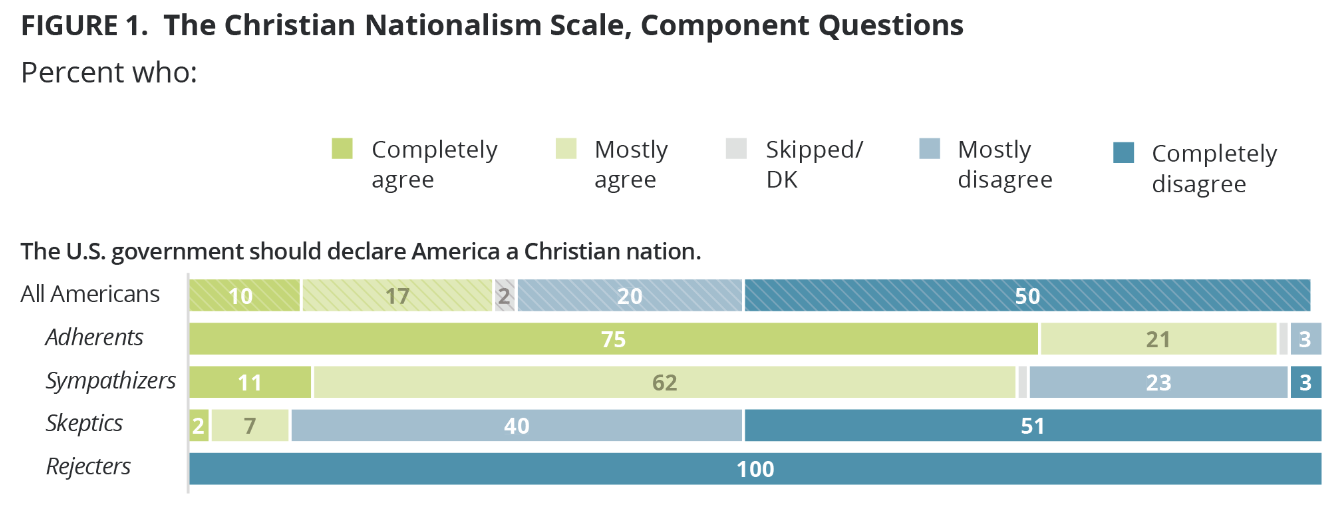
The findings of the just-released PRRI/Brookings Christian Nationalism Survey are generally reassuring news for secularism.
Thankfully, half or even up to two-thirds of Americans reject Christian nationalist precepts. “More than one-third of Americans (35 percent) say they have not heard the term ‘Christian nationalism,’ but the term has a decidedly negative connotation among those who have been exposed to it,” PRRI reports.
However, the survey of 6,000 Americans also shows the extremist views of those who sympathize with or are considered adherents of Christian nationalism, finding that they are seven times more likely to support political violence. Those who are over 50, are white evangelicals, Republicans and lack a college degree are most apt to favor Christian nationalist statements.
The survey found that by a margin of two to one, Americans overall reject the assertion that “God intended America to be a new promised land where European Christians could create a society that could be an example to the rest of the world.” However, more than eight in 10 Christian nationalism adherents agree with that statement. The major survey found that Christian nationalism beliefs are strongly correlated with anti-immigrant views, support for QAnon and a denial that white supremacy is a problem.
Key findings show the rejection of Christian nationalism:
- Fully 50 percent of all Americans completely disagree with the statement that “the U.S. government should declare America a Christian nation.” Adding the 20 percent who “mostly disagree,” it rises to 70 percent of Americans.
- Fifty-eight percent mostly or completely disagree that “U.S. laws should be based on Christian values” and 61 percent disagree that “if the U.S. moves away from our Christian foundations, we will not have a country anymore.”
- A firm two-thirds (66 percent) disagree or mostly disagree that “being Christian is an important part of being truly American.” Likewise, two-thirds (77 percent) reject or mostly reject the statement, “God has called Christians to exercise dominion over all areas of American society.”
This analysis shows that only 10 percent of Americans either agreed or completely agreed with Christian nationalism assertions, with an additional 19 percent being sympathizers. PRRI identified 39 percent of Americans as skeptics of Christian nationalist claims and found that 29 percent completely disagreed with all five statements.
It’s no surprise that the “unaffiliated” and Jewish are tied with having the most “rejecters” of Christian nationalism at 61 percent, with an additional 31 percent being “skeptics” of Christian nationalist claims. Non-Christian religionists followed closely.
However, one surprising finding was that Mormons actually had the highest number of “skeptics” of Christian nationalism at 50 percent, although only 10 percent are rejecters. Not quite half of Hispanic Catholics, white Catholics, white mainline Catholics, Hispanic Protestants, Black Protestants and other Protestants of color fall into the “skeptics” camp.
It’s truly no surprise that white evangelical Protestants have the highest number of Christian nationalist adherents at 29 percent, with an additional 35 percent being sympathizers.
“Identifying as evangelical or born-again is positively correlated with holding Christian nationalist views across racial and ethnic lines,” reports PRRI. Those who identify as born-again or evangelical are about five times as likely to be Christian nationalism adherents as members of the same racial or ethnic groups who identify as Christian but not evangelical.
As support for Christian nationalism goes down, so does reported church attendance rates, PRRI states. PRRI points out that “Americans who lean toward supporting Christian nationalism are not, as some have theorized, Christian in name only. They are significantly more likely than other Americans to be connected to churches and to say religion is important in their lives.” Christian nationalist adherents are twice as likely as Americans overall to report attending religious services at least a few times a month.
Likewise, most Republicans qualify as either Christian nationalist sympathizers (33 percent) or adherents (21 percent), while at least three-quarters of both independents (46 percent skeptics and 29 percent rejecters) and Democrats (36 percent skeptics and 47 percent rejecters) reject or mostly reject Christian nationalism. Sums up PRRI: “Republicans (21 percent) are about four times as likely as Democrats (5 percent) or independents (6 percent) to be adherents of Christian nationalism.”
More than 70 percent Christian nationalism adherents have a favorable view of Donald Trump, while only one-third of Americans overall have a favorable view. The survey found no significant differences in views by gender, with 10 percent of both men and women qualifying as adherents. However, support for Christian nationalist beliefs was found to increase with age. Those with a high school degree or less, or some college but no four-year degree, were roughly twice as likely as those with a four-year college degree or postgraduate degree to be Christian nationalism adherents.
The survey found that 65 percent of Americans agree that white supremacy is still a major problem in the United States today, but a majority of Christian nationalist sympathizers and adherents disagree. Two-thirds of sympathizers and three-quarters of adherents even say discrimination against white Americans is as big of a problem as discrimination against Black Americans and other minorities.
Comparable discrepancies are seen with perspectives on immigrants. Anti-Muslim sentiments are tied to Christian nationalism views. Similarly, half or more of sympathizers and adherents agree that “in a truly Christian family, the husband is the head of the household, and his wife submits to his leadership.”
“This survey proves that most Americans would never want to see our secular democracy toppled in favor of a fundamentalist Christian theocracy,” comments FFRF Co-President Annie Laurie Gaylor. “But all too many Christian nationalism adherents are sitting in our state capitols, voting on our lives, and they and their judicial allies pose a real threat.”
The Freedom From Religion Foundation is a national nonprofit organization with more than 39,000 members across the country. It protects the constitutional separation between state and church and educates about nontheism.

